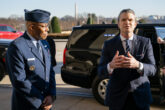December 13, 2017
Military Chiefs’ Reluctance to March
In a dizzying series of tweets and news stories on Monday, the Pentagon appeared to simultaneously embrace transgender recruits while the Trump administration was losing its bid in court to deny their entry into the service. Once the dust settled, it became clear that, for now, the slow policy change on transgender service that began under President Obama will continue under President Trump. Transgender people who want to serve their country in uniform may enlist starting on Jan. 1; those now serving can continue, with appropriate support from the military’s medical and personnel systems. Far from being a military coup, this was merely a case of the Pentagon following existing law while the courts haggle over what exactly the law is.
That fact may itself be startling at a time when senior administration officials seem more willing to unlawfully promote their boss—or misuse their offices—than follow the law. The Pentagon chiefs’ response to the transgender litigation illustrates how they differ from other senior officials, for better or worse. In response to Trump, the military’s leadership has improvised a new norm of civil-military relations: something in between a yes and a no that doesn’t amount to insubordination but does help modulate Trump’s excesses.
Although civilian Cabinet officials, generals, and admirals are all “Officers of the United States” under the Constitution, appointed by the president with the advice and consent of the Senate, they have very different traditions of service. Over more than 240 years, but especially since World War II, the military has evolved into a profession that puts a premium on apolitical service to presidents of both parties. Senior military officers serve tours in key positions that are staggered so that they transcend administration boundaries. Senior officers and junior troops alike are bound by military justice provisions and regulations that sharply curtail their political activity. By rule, custom, and inclination, today’s military leaders shun direct involvement in partisan politics, such as standing on stage during rallies, even at the request of their commander in chief. Those officers who do politick for the boss—like Lt. Gen. H.R. McMaster writing a controversial op-ed supporting Trump’s “America First” policy—stand out as conspicuous exceptions to the rule.
Read the full op-ed in Slate.
More from CNAS
-
National Security Has a Human Capital Problem and There’s No Fast Way Out
National security doesn’t really exist without the military forces and supporting civilians to carry it out. Recruitment remains a problem for the armed forces. And there’s a ...
By Katherine L. Kuzminski
-
The Department of Defense’s Breakthrough Nuclear Moment Risks Slipping Away
Unless they act, the Department of Defense’s breakthrough nuclear moment may vanish before it really happens....
By Will Rogers
-
Sharper: National Security Human Capital
U.S. national security depends on the nation’s ability to leverage the expertise of uniformed warfighters and the highly skilled civilian professionals who develop and impleme...
By Charles Horn & Taren Sylvester
-
Hegseth Brings the Culture War to Combat
The fundamental challenge of military leadership lies in creating cohesive teams that can work together in an environment of mortal risk and, when called upon to do so, use le...
By Dr. Jason Dempsey




